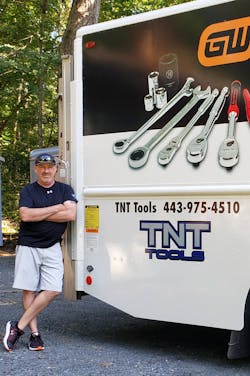Mobile tool sales businesses are as different and diverse as the people and landscapes that make up this country. Local industry can have a significant impact on who your customers are and what kinds of tools they need for day to day business.
The following independent mobile tool dealers each have owned and operated their businesses – on opposite ends of the country – for more than a decade. While their customer profile couldn’t be more different, both business owners share plenty of similarities. For example, both adhere to sound strategies for providing optimal customer service and take some of the more universal tool industry challenges (such as the occasional heavy traffic and online shoppers) in their stride.
The landscape may change (drastically) in the 3,000-odd miles it takes to traverse one side of the country to the other, but successful tool businesses are built on a firm foundation consisting of a lot of the same elements, no matter where you live.
East Coast Hustle
Marty Pessagno
TNT Tools
Prince George’s County, Maryland
Independent tool dealer and owner of TNT Tools, Marty Pessagno grew up on the East Coast in Maryland and has been in the mobile tool business for 12 years, serving Prince George’s County working with the GEARWRENCH Street Team.
He was with a flagship for ten of those years and now has switched over to calling the shots as an independent for about a year and a half. For Pessagno, selling tools runs in the family.
“My brother was a tool distributor at one time; we hung out all the time and we still do,” he says. “I thought it would be neat to do something on my own. He got out, and I stayed with it and stuck it out. I love [this business]. I think it’s great. There’s a lot of freedom, but there’s a lot of responsibility. I can jump in a truck, put a name on the side, and go out and do this, but there’s a little bit more to it. We’ve actually got to go out and have conversations with people and get to know them on a personal basis, instead of just going in there and asking, ‘Hey, what do you need?’ I like to get to know these guys so we’re both on the same playing field. Talking, communication, texting, and calling … it all pays off in the long-run.”
Pessagno says the unique thing about this region is that it’s largely driven by the U.S. government, which has a large presence in Prince George’s County. This applies to his business, too. Pessagno makes runs to Andrews Airforce base, sometimes taking part in both public and private sectors and even navigating the occasional shutdown.
“A lot of people live on base and do business off-base, which helps out," he says. "If there’s a shutdown everyone kind of holds their money, in this area.”
The East Coast distributor enjoys his customer base.
“I have some real neat shops … [including] some guys who are independent and will work on one high-end, specific make like BMW or Mercedes," he says. "They do really well in this area. Then you’ve got your dealerships in this area which I deal with, which are all top-of-the-line and state-of-the-art, with built-in toolboxes in the wall and … shared computers. It’s unbelievable how some of these shops are set up now. Everything comes out of the ceiling for water and oil; lifts come straight up from out of the ground. Technicians will go into a special room to pick up high-end tools and check them out.”
In addition to dealerships and small shops, Pessagno visits body shops, too, many of which have been [purchased] by the Maryland-based company Caliper. He also stops at small independent shops and even specialty shops that handle stereo systems, window tinting, and car wraps.
Making the sale
Pessagno has been in sales for a long time. He knows how to position his product and himself for optimal results.
“What I do now as an independent is educate these technicians; that’s the biggest thing … and these days everyone is looking to save a dollar,” Pessagno says.
Finally, Pessagno is a self-proclaimed “clean freak” and says it has made a difference in his business.
“The first thing my customers see is either me or my truck," he says. "The next thing they see is the inside of my truck. There’s a place and order for everything. When customers see the truck, I hear, ‘It’s unbelievable, your truck’s so clean."
Living and working on the East Coast is not without its challenges. The gridlock of traffic can set Pessagno back in his schedule. He says he can count on this happening a couple of times per month.
“The majority of time there are no back roads, and you’re stuck where you’re at," he says. "I’ll text the guys and [let them] know what’s going on, even if I’m not selling. Communication is key to success in this industry.”
Despite this, Pessagno runs a tight ship (truck) and is looking at putting a second truck on his route down the road. Customers know they can depend on him to provide tools, education, and service at a fair price.
Navigating the Pacific Northwest
Abe Douglas
Abe’s Toolbox
Olympia, Washington
Abe Douglas, owner of Abe’s Toolbox, is based in Rochester, Washington, about 70 miles from the Pacific Ocean. He was with a flag for ten years before going independent and has been in the tool selling business a total of 12 years. Douglas has lived in the state of Washington since 1990, moving there as a technician employed in the military. After that, he worked with law enforcement as a corrections officer for several years. Eventually, Douglas decided he wanted to try something new and go the self-employed route. These days, he drives his 2008 Freightliner MT 55 in the Washington state capital, from Tumwater to south Centralia, Chehalis, and Napavine. He runs a route that’s about 50 percent heavy duty and 50 percent automotive – with a bit of autobody thrown into the mix.
Much of Douglas’ route is in lumber territory, with a great many logging companies and sawmills dotting the landscape. He says workers in this industry use a lot of the same tools as his heavy duty customers.
Show them what they’re missing
This veteran tool dealer isn’t shaken by changes taking place in the aftermarket or online tool sales. His approach is simple: show customers the tools they could benefit from, and be consistent and effective enough that they’ll buy from you time and time again.
“Online [sales] are not much of a factor,” he says. “Customers buy for the service. If you provide a service, they’re going to come buy from you. Buying online very seldom comes up, and I have enough customers and do enough business where if [some customers] want to buy online, they can do that, but [then] they know they can’t come to me to get stuff warrantied and taken care of unless they’re a customer.”
What are Douglas’ secrets for better sales?
“No secrets, really," he says. "You just tote and promote stuff; bring new tools or different tools around and just show guys what’s available. Most of the time you show them stuff and it’s like they never knew a tool for that existed.”
Douglas says he does a lot of tote and promote, which has worked well for him over the years. That’s one strategy; the other is simply treating his customers right.
“They’re buying from me, not the tool company," he says. "Treat [your customers] right and they just come back.”
Apart from taking care of customers, Douglas says it’s essential that new and seasoned tool dealers alike pay themselves first and put money aside for the future.
“Invest in your retirement,” Douglas says. “I expect my customers to pay me at least $40 per week. It should be easy for a dealer to put $40 or more per week into some kind of retirement fund. Start investing while you are young, but it is never too late to start.”
Tools and Training
With a route deep in the heart of the lumber industry, Douglas keeps more heavy duty stuff on his truck than most, like a good variety of larger-sized tools and “a ton of Milwaukee stuff.” He may get into diagnostic products a bit, but most of his heavy duty stops use factory tools. While he keeps a heavy duty scan tool on the truck, Douglas says it’s still a challenge to find the products with the appropriate amount of coverage for his heavy-duty customers.
Because Douglas’ customer base is so specific, he says it can be a challenge to work with suppliers to get product (and the right product) ordered and shipped in a timely fashion.
“I’m looking for specific items, and a lot of times, not your normal items," he says. "It can be difficult to get the oddball, oversized stuff. Probably the biggest problem is ordering pieces of things, like parts for tools.”
Douglas says business is consistent, and he does “whatever it takes” to do the job and do it well, staying busy even if that means putting in 14 hours a day, five days a week. He looks forward to celebrating retirement in the next five years and seeing where the next adventure takes him.
When running a buy-one, get-one deal, TNT Tools owner Marty Pessagno makes sure to have a lot of visual signs on the truck. He puts the candy in the back, so customers walk all the way through the truck.
“Guys love [buy-one-get-one deals] with the wrenches, socket sets, stuff that GEARWRENCH has to offer,” he says. He always works with his customers to get a good deal. “If guys are saving money, I’m going to be happy doing what I’m doing.”
About the Author
Sara Scullin
Editor | PTEN and Professional Distributor
Sara Scullin is the editor of PTEN and Professional Distributor magazines. These publications are part of the Endeavor Business Media Vehicle Repair Group, which includes Fleet Maintenance, Professional Tool & Equipment News (PTEN), Professional Distributor magazines and VehicleServicePros.com.

